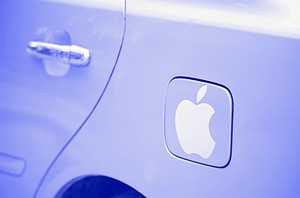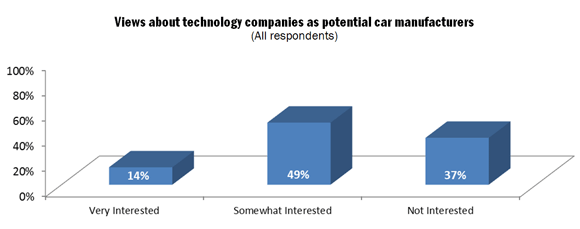The Center’s Future of Transportation Study found that 63% of Americans are interested in cars built by Apple, Amazon, Google and other tech companies. Is this bad news for Ford, GM and Toyota?
_______________________________________________________________________________________
By Brad Berens
A few years ago, I gave a talk at an innovation event in Colgate-Palmolive’s New Jersey campus. Later, the next time I was in a pharmacy needing to buy toothpaste, I thought, “I wonder if this stuff is really as good as the Colgate people claimed?”
 I bought a tube, tried it, loved it, and have never looked back.
I bought a tube, tried it, loved it, and have never looked back.
On the surface this is a trivial story — one that doesn’t make a great deal of sense in a column about car brands — but there’s a deeper issue.
Prior to that moment in the pharmacy aisle I had been a Crest user for more than four decades.
I’d never thought much about toothpaste at all, and I hadn’t made a conscious decision to become a Crest user. Crest was the toothpaste that my mom had tossed into the shopping cart I was riding in the first time I realized that people buy toothpaste: it doesn’t sprout from the bathroom drawer on its own.
Let’s unpack this: it took me flying 3,000 miles twice and giving an hour-long talk to switch toothpaste brands. That’s a high bar. And, it doesn’t scale.
There are a lot of highfalutin definitions of brand (you can find 30 of them here), but the simplest is that a brand is a substitute for information.
As Daniel J. Levitin argues in his brilliant book, The Organized Mind: Thinking Straight in the Age of Information Overload, we each have a limited amount of decision-making energy each day, and we don’t want to squander that energy on trivial decisions. There’s a reason, after all, why we say that we “pay attention” to things: attention is a form of cognitive currency, and like all currencies we don’t have an infinite supply.
Enter brands as attention-saving shortcuts.
Passion brands exist — these are the handful of brands we adopt as key parts of our identities over a lifetime (see my friend Jeff Rosenblum’s book Friction on this topic).
_________________________________________________________________________________________________
Today’s car manufacturers don’t need to lose sleep worrying about high tech companies actually making cars. Tech companies don’t want to be in the car business. What tech companies care about is the data thrown off by cars, and they care even more about integrating everything that happens inside the car into their overall plans for ubiquitous computing powered by their propriety, walled-garden platforms.
_________________________________________________________________________________________________
Most brands, though, are utilities. We don’t want to spend a lot of mental energy choosing a soft drink every time the weather is hot (and we don’t want to do the sensible thing and have ice water), so most cola drinkers have an arbitrary preference for Coke or Pepsi. I never wanted to think about toothpaste: I just wanted to brush my teeth.
The function of a car brand
There are people who care about cars and for whom the car they drive is a passion brand. There are also people for whom a car is just a way to get around, like toothpaste is a way of keeping your teeth clean.
If you’re a car nut, there’s the car you drive and then there’s the car you dream about one day owning– maybe it’s a Mercedes, a Lamborghini or a tricked-out Mustang.
If you just need to get around, then you’ll figure out your needs and create a consideration set. If you’ve decided on a four-door Asian sedan and you’re not looking at a Lexus or Genesis, then you might quickly settle on a consideration set of Honda, Toyota, Mazda and Subaru. (This is what I did the last time I shopped for a car.)
For both ends of the spectrum, car brands are important.
This is why the responses to one question in our Future of Transportation survey were particularly fascinating.
We asked, “If Amazon, Apple, Facebook or Google or another tech company were to create a car, then how would you describe your interest in getting one?”
Here are the high level responses:

Sixty-three percent of our respondents — a snapshot of the U.S. population — were somewhat or very interested in a car made by Amazon, Apple, Facebook, Google or a similar technology company.
Sixty-three percent is an overall number, and it’s misleadingly low because respondents older than 44 lowered the average. Those aged 45 to 64 were 55 percent very or somewhat interested, while only 43 percent of those 65 and older were very or somewhat interested. (That’s still a high percentage of often-change-averse seniors.)
In contrast, respondents aged 14 to 17 were 78 percent interested (very or somewhat), those aged 18 to 24 were 72 percent interested (again, very or somewhat), and those between 25 and 44 were 77 percent very or somewhat interested. For these cohorts, enthusiasm for a car made by a tech company ranges between 11 percent and 17 percent higher than average.
In simpler language, eight out of ten people aged 25 to 44 are open to the idea of buying a car with the Apple logo on it instead of Ford.
What this means for today’s car manufacturers
Today’s car manufacturers don’t need to lose sleep worrying about high tech companies actually making cars. Sure, Google has its little self-driving Koala car — tech columnist Kara Swisher amusingly called it a “clown car” — but it’s a proof of concept rather than something that will ever be mass produced like a Camry.
Tech companies don’t want to be in the car business.
Cars are more complicated to build than smart phones or laptops, and the safety requirements for two tons of metal hurtling down the highway are higher than those for a handheld supercomputer that you might accidentally drop in the toilet.
What tech companies care about is the data thrown off by cars, and they care even more about integrating everything that happens inside the car into their overall plans for ubiquitous computing powered by their propriety, walled-garden platforms.
That’s why Apple has Car Play, which integrates your iPhone and Siri into the driving experience. Likewise, Google has Android Auto, which plugs in your Android phone and Google Assistant. Amazon’s ambitions for Alexa seem limitless: Alexa is already embedded with cars from Ford, Volkswagen, Hyundai, with BMW and others coming soon.
Tech companies don’t want to be in the car business, but they do want their brands to be critical factors in a car buyer’s decision.
For many Americans this is already close to reality. When we asked our respondents how they felt about technology in cars, 39 percent agreed that, “The inclusion of digital technology for drivers is an important factor influencing my car purchase decisions.”
Brands are shortcuts, substitutes for information, and in the near future the primary shortcut you select when choosing a car might be the digital technology inside the car. Meanwhile, traditional distinguishing features like design, speed, color and miles-per-gallon might become mere commodities, like toothpaste.
Car manufacturers need to pay attention, and partner strategically with these tech companies.
__________

Brad Berens is the Center’s Chief Strategy Officer.
See all columns from the Center.
September 27, 2017

